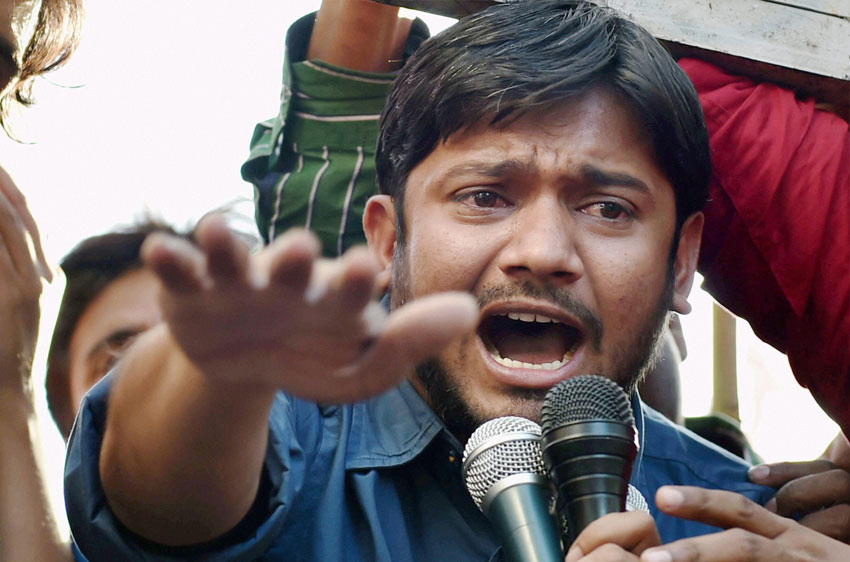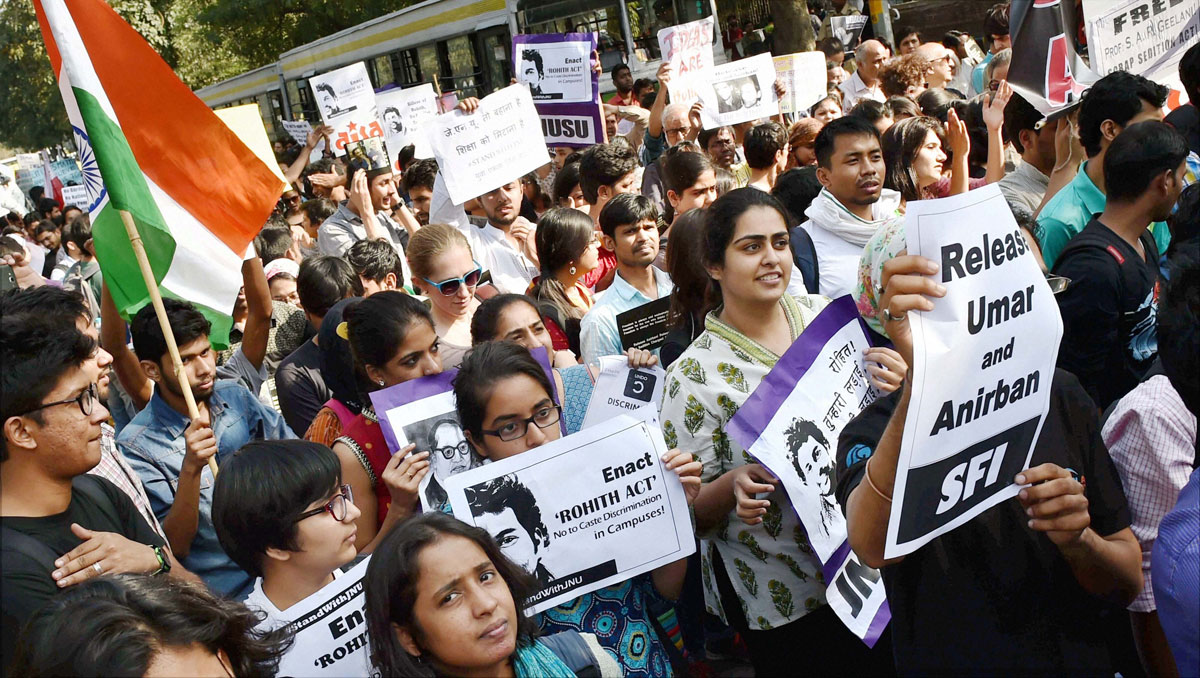JNU STUDENTS DECIDE NOT TO ACCEPT PROBE PANEL REPORT
JNUSU students rally at Jantar Mantar in New Delhi, Mar. 15. (Atul Yadav | PTI)
JNU students, who have been served show-cause notice to explain their alleged role in the controversial February 9 event, have decided to “not accept” the report of a university probe panel and said they will send their reply accordingly. (@siliconeer, #siliconeer, #JNU, #KanhaiyaKumar, #FreedomofSpeech, #JNUSU)
A decision in this regard was taken at a JNU Students’ Council meeting which went on till late nightm Mar. 16, in New Delhi.
“The inquiry report is based on an unfair probe process and hence, we refused to accept its findings… Our replies to the show-cause notice will be sent accordingly,” a member of the council said.
Show-cause notices were issued to 21 students on March 14 asking them to explain why disciplinary action should not be initiated against them after the high-level committee of the university found them guilty of “violating university norms and discipline rules.”
The report has, according to sources, recommended rustication of five students including JNU Students’ Union President Kanhaiya Kumar, Umar Khalid and Anirban Bhattacharya who are facing sedition charges.
Kanhaiya, Umar and Anirban were arrested on charges of sedition in connection with the program. Kanhaiya was released on bail from Tihar on March 3 while Umar and Anirban were released on bail Mar. 18.
“Two of the students are in jail while the inquiry was completed. Another student, Aishwarya Adhikari who was earlier suspended and had also been served a show-cause notice, finds no mention of her name in the committee report. It is a highly-biased and undemocratic inquiry,” the council member said.
Earlier, JNU authorities extended the deadline for replying to the show-cause notice served to March 18 after the students had sought more time to seek legal opinion on the matter.
“The Vice Chancellor has granted an extension till March 18 for students to reply to the show cause notice,” a senior university official said.
The final “quantum of punishment” for the students will be decided on the basis of response to the notices.
The report of the five-member panel, which was submitted on March 11, has pointed out lapses on part of the students as well as the administration.
Taking into account the role of outsiders in the controversial event, the university panel has found Umar and Anirban “guilty” of arousing communal, caste or regional feeling or creating disharmony among students.
While no specific charges have been pointed out against students union president Kanhaiya Kumar, who is facing sedition charges in connection with the event, the university has found ABVP member Saurabh Sharma “guilty” of blocking traffic on February 9, the day of the controversial event.

Group of JNU teachers release report, says Afzal event could have been avoided
A group of 10 JNU teachers has released a 400-page document prepared last year detailing past controversial events on the campus, suggesting that the flashpoint Afzal Guru event and its fallout could have been avoided had the varsity administration acted on it.
The teachers, who are opposing the teachers’ association for their support to students accused of sedition in connection with the Afzal Guru event last month, claimed, Mar. 16, that the report was shared with the Varsity administration.
“It is a matter of serious concern that some JNU academics masquerading as liberals and feminists have engaged in nefarious and anti-national activities of maligning India publicly through their statements, lectures and extra-academic activities of their NGOs which receive liberal funding from hostile agencies,” the report alleged.
“The problem is compounded by the fact that these very few academics brainwash and recruit the gullible and academically weak students into their fold in order to use them as cannon fodder in various rallies organized by them in and outside the campus,” it further claimed.
The report compiled by 10 professors of the university, contained alleged posters put up at the events, some dating back to 2010, titled “Remembering shaheed Maqbool and shaheed Afzal,” “One noose three deaths: Afzal Guru, Justice, Knowledge,” “Martyrs are not buried they are sown,” “Azaadi the only way ahead in Kashmir,” “Contesting Indian nationalism: Voices of Azadi from Kashmir,” among others.
The report also contains copies of few complaints made to the police and administration by different people in connection with events of previous years organized by JNU students and teachers on and outside campus.
The group of teachers, who are members of the JNUTA but has a different stand on the current row, demanded that a thorough probe be conducted in the incidents highlighted in the report so that the “root problems” can be “diagnosed.’
“A group of 10 teachers had compiled this report which was also shared with the administration a year back. Such activities have repetitively happened here if the administration had kept a check or acted in time this incident would not have happened,” said Hari Ram Mishra, who teaches at Special Center for Sanskrit Studies, and is among those who compiled the report.
A senior university official when asked to comment on the report said, “Whether or not any report was received by the administration needs to be checked with records. Whenever any act violating norms has been brought to notice of university, action has been taken.”
JNUTA General Secretary Vikramaditya Choudhary said, “we are not aware of any such report as far as the current controversy is concerned, we are not standing by any activities but by institutional autonomy.”
While the JNUTA has been supporting the students agitation, a group of its members have been maintaining that it is teachers’ task to “guide” the students and not “misguide” them. JNU has a total of 610 teachers.


